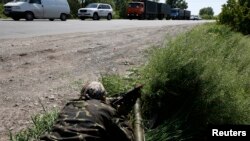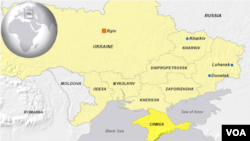GENEVA —
A new United Nations report finds that violence by anti-government groups in eastern Ukraine is causing an "alarming deterioration" of human rights amid a political crisis between Kyiv and pro-Russian separatists.
The 36-page report cites examples of targeted killings, torture and beatings, as well as abductions, intimidation and sexual harassment, largely carried out by what it calls well-armed anti-government groups in eastern Ukraine.
“It points to evidence of lack of law and order...especially as a result of the presence, the action, the direct influence through the gangs," said Gianni Magazzeni, who leads the European branch of the Office of the U.N. High Commissioner for Human Rights. "But also indirectly, through intimidation and threats on journalists, on ordinary people, when it comes to the ability for anyone to express oneself…some self-proclaimed mayors have also banned some political parties.”
In a statement Friday, Russia's Foreign Ministry accused the U.N. of a "complete lack of objectivity," saying the report had "glaring inconsistencies" and "double standards."
The ministry accused the report authors of following political orders to whitewash the pro-Western leadership, while ignoring "the crudest violations of human rights by the self-proclaimed Kyiv authorities''.
Under siege
The report finds the media is practically under siege in eastern Ukraine.
It says journalists, bloggers and other media face increasing threats and acts of intimidation, including abduction and unlawful detention by armed groups. The report notes at least 23 foreign and Ukrainian members of the media have been abducted and unlawfully detained, primarily in the city of Slovyansk.
U.N. human rights monitors also cite numerous examples of harassment, intimidation and blocking of broadcasts in Crimea, a southern region of Ukraine that was annexed by Russia in March. Neither Kyiv nor its Western allies recognize the annexation. The monitors say a number of radio and TV stations are no longer on the air.
The report finds differences between Russian law and Ukranian law are creating difficulties for Crimean residents. For example, it notes people with HIV no longer are receiving treatment for their health condition because this has been curtailed under Russian law.
Concerns about minorities
U.N. human rights chief Navi Pillay said Friday the report findings also raise deep concerns about minorities facing harassment in Crimea.
The report notes 7,200 people from Crimea, mainly Tatars, have left the peninsula and are displaced in other parts of Ukraine.
Magazzeni tells VOA the U.N. is very concerned about hate speech and other forms of harassment and intimidation being leveled at the Tatars. He notes May 18 is the 70th anniversary of the mass deportation of Tatars from Crimea by the government of Soviet dictator Josef Stalin.
“We are very conscious of what they have gone through and the potential additional discrimination," he said. "I think it is not an issue if they choose to leave, but what is the impact vis-à-vis their land, vis-à-vis their rights, vis-à-vis their work, vis-à-vis their family…for those who have stayed behind, those are critical issues that we would like to be able to monitor.”
Violence continues
Meanwhile, there were reports of more violence in eastern Ukraine Friday, including fighting between Ukrainian government troops and separatist forces around the cities of Slovyansk and Kramatorsk, and the seizure of a Ukrainian National Guard barracks by separatists in the city of Donetsk.
In the port city of Mariupol, the scene of bloody clashes between Ukrainian security forces and anti-government demonstrators earlier this month, the situation was calm Friday as thousands of factory workers patrolled the streets jointly with police.
The joint patrols were formed after Rinat Akhmetov, Ukraine's richest man, called on steelworkers at plants he owns to help police restore order following the street fighting and a subsequent wave of lawlessness.
Turning to Russia
Separatists in the eastern Ukrainian provinces of Donetsk and Luhansk held referendums on self-rule Sunday, after which they declared independent people's republics in the two regions. Separatist leaders there have said they will not hold Ukraine's May 25 presidential election in their respective regions.
Separatist leaders in Donetsk say they have asked Moscow to consider formally absorbing the region into the Russian Federation, but on Thursday Russia's Interfax news agency quoted a spokesman for Russia's Foreign Ministry as saying it had not received an official request from the "Donetsk People's Republic" to join Russia.
Britain and the United States have warned Russia they will issue broader economic sanctions if Moscow tries to disrupt Ukraine's May 25 election.
On Friday, President Obama spoke with French President Francois Hollande about Ukraine. A statement from the White House said Obama repeated that Russia will face "additional costs" if it continues its provocative behavior.
U.S. Secretary of State John Kerry said Thursday he hopes Russia will encourage pro-Russian separatists in eastern Ukraine to "work through the process that has now been opened up" -- an apparent reference to national unity talks that opened in Kyiv Wednesday, without the separatists' participation.
The U.N.'s Pillay appealed for an end to the ongoing rhetoric of hatred and propaganda. This, coupled with killings and other acts of violence, she says, is fueling the escalation of the crisis in Ukraine.
The 36-page report cites examples of targeted killings, torture and beatings, as well as abductions, intimidation and sexual harassment, largely carried out by what it calls well-armed anti-government groups in eastern Ukraine.
“It points to evidence of lack of law and order...especially as a result of the presence, the action, the direct influence through the gangs," said Gianni Magazzeni, who leads the European branch of the Office of the U.N. High Commissioner for Human Rights. "But also indirectly, through intimidation and threats on journalists, on ordinary people, when it comes to the ability for anyone to express oneself…some self-proclaimed mayors have also banned some political parties.”
In a statement Friday, Russia's Foreign Ministry accused the U.N. of a "complete lack of objectivity," saying the report had "glaring inconsistencies" and "double standards."
The ministry accused the report authors of following political orders to whitewash the pro-Western leadership, while ignoring "the crudest violations of human rights by the self-proclaimed Kyiv authorities''.
Under siege
The report finds the media is practically under siege in eastern Ukraine.
It says journalists, bloggers and other media face increasing threats and acts of intimidation, including abduction and unlawful detention by armed groups. The report notes at least 23 foreign and Ukrainian members of the media have been abducted and unlawfully detained, primarily in the city of Slovyansk.
U.N. human rights monitors also cite numerous examples of harassment, intimidation and blocking of broadcasts in Crimea, a southern region of Ukraine that was annexed by Russia in March. Neither Kyiv nor its Western allies recognize the annexation. The monitors say a number of radio and TV stations are no longer on the air.
The report finds differences between Russian law and Ukranian law are creating difficulties for Crimean residents. For example, it notes people with HIV no longer are receiving treatment for their health condition because this has been curtailed under Russian law.
Concerns about minorities
U.N. human rights chief Navi Pillay said Friday the report findings also raise deep concerns about minorities facing harassment in Crimea.
The report notes 7,200 people from Crimea, mainly Tatars, have left the peninsula and are displaced in other parts of Ukraine.
Magazzeni tells VOA the U.N. is very concerned about hate speech and other forms of harassment and intimidation being leveled at the Tatars. He notes May 18 is the 70th anniversary of the mass deportation of Tatars from Crimea by the government of Soviet dictator Josef Stalin.
“We are very conscious of what they have gone through and the potential additional discrimination," he said. "I think it is not an issue if they choose to leave, but what is the impact vis-à-vis their land, vis-à-vis their rights, vis-à-vis their work, vis-à-vis their family…for those who have stayed behind, those are critical issues that we would like to be able to monitor.”
Violence continues
Meanwhile, there were reports of more violence in eastern Ukraine Friday, including fighting between Ukrainian government troops and separatist forces around the cities of Slovyansk and Kramatorsk, and the seizure of a Ukrainian National Guard barracks by separatists in the city of Donetsk.
In the port city of Mariupol, the scene of bloody clashes between Ukrainian security forces and anti-government demonstrators earlier this month, the situation was calm Friday as thousands of factory workers patrolled the streets jointly with police.
The joint patrols were formed after Rinat Akhmetov, Ukraine's richest man, called on steelworkers at plants he owns to help police restore order following the street fighting and a subsequent wave of lawlessness.
Turning to Russia
Separatists in the eastern Ukrainian provinces of Donetsk and Luhansk held referendums on self-rule Sunday, after which they declared independent people's republics in the two regions. Separatist leaders there have said they will not hold Ukraine's May 25 presidential election in their respective regions.
Separatist leaders in Donetsk say they have asked Moscow to consider formally absorbing the region into the Russian Federation, but on Thursday Russia's Interfax news agency quoted a spokesman for Russia's Foreign Ministry as saying it had not received an official request from the "Donetsk People's Republic" to join Russia.
Britain and the United States have warned Russia they will issue broader economic sanctions if Moscow tries to disrupt Ukraine's May 25 election.
On Friday, President Obama spoke with French President Francois Hollande about Ukraine. A statement from the White House said Obama repeated that Russia will face "additional costs" if it continues its provocative behavior.
U.S. Secretary of State John Kerry said Thursday he hopes Russia will encourage pro-Russian separatists in eastern Ukraine to "work through the process that has now been opened up" -- an apparent reference to national unity talks that opened in Kyiv Wednesday, without the separatists' participation.
The U.N.'s Pillay appealed for an end to the ongoing rhetoric of hatred and propaganda. This, coupled with killings and other acts of violence, she says, is fueling the escalation of the crisis in Ukraine.






